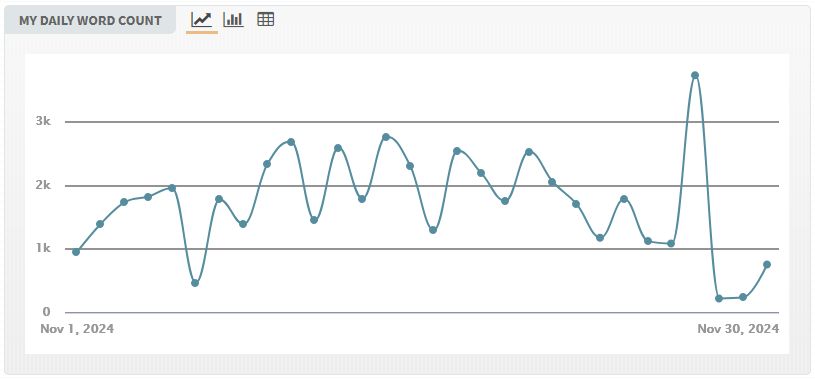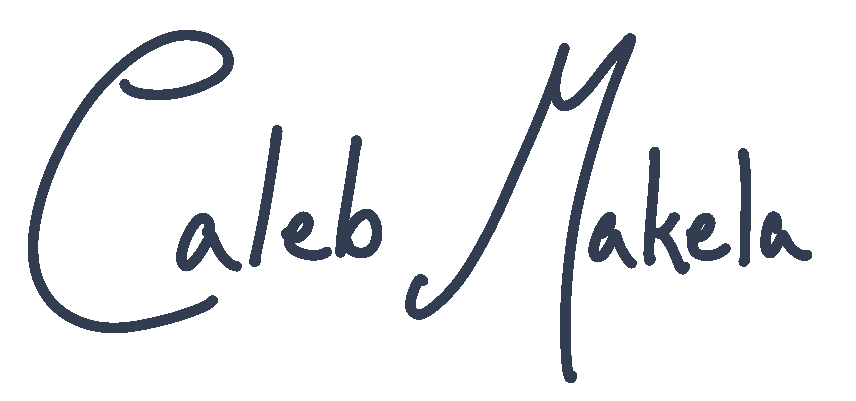Am I avoiding it? I thought to myself last night, thinking of this very post and the first draft that it’s about. I originally planned to write about ‘The Mountain’ a month after finishing the first draft, thinking that would be enough time to wait before reading over it again and writing my thoughts on it and the process.
Now here we are, two weeks later–and while it’s later than planned, it’s better than never.
I wrote ‘The Mountain’ as part of National Novel Writing Month (NaNoWriMo). It wasn’t the first time I had attempted the 50,000-word November sprint, but it was the first time I succeeded. It proved itself to be a challenge, especially after not writing seriously for years. I still write for Dungeons and Dragons, and occasionally fill out little prompt books, but those are a different kind of writing. Still, at the end of the month, I found myself with a 51,712-word first draft of a novel.
I want to talk about that novel a bit, but I also want to talk about the process of writing it.
The Idea
The idea for ‘The Mountain’ was actually lifted straight out of my ever-expanding game ideas list, and is by no means original (then again, what story idea is?). It is the story of a young man who, lacking the tools to handle trauma in his life, chooses instead to run away and climb the eponymous Mountain. Along the way, the Mountain challenges him, and in those challenges, he learns more about himself and his journey through life.
The setting for the story is modern, but the Mountain is a place of magic. The choice was heavily inspired by Dungeons of Hinterberg, a game where the Austrian Alps become a tourist destination for monster hunters and dungeon delvers after a mysterious happening fills the area with, well, monsters and dungeons. Great game, highly recommended.
So, with stories of this magical place swirling in his mind since childhood, our protagonist decides that conquering it will surely bring meaning to his life now that everything seems lost. I’m sure that, armed with even this slim bit of plot, you know where this story might be going.
When I started writing it, I had no idea where it was going to end up, or that I was going to be a part of it.
The Inevitable Self-Insert
The idea of the author self-insert isn’t novel by any means. In comes in all shapes and sizes and, almost by necessity, will always be present. On one end, you’ve got the literal self-insert often seen in fan fiction, and on the other, you’ve got the subtle influences of the characters being painted by the world view of the author. Though one might argue that isn’t a self-insert so much as the way all writing–and art for that matter–goes.
For ‘The Mountain’, while I’m sure I was putting bits of myself into it here and there, I started to lean into it about halfway through the month. As I observed the protagonist and his mind, I realized that his fears and worries were my own. He had just lost a loved one, someone that always believed in him, and all he could think of was that he hadn’t become someone worthy fast enough for them to see. So, of course, he begins to think he will never be someone.
As I unraveled his thoughts, I did the same with mine, in a way. Thoughts that I had buried for over a decade. The story turned from a project into a sort of catharsis.
It made me uncomfortable at first, and I found myself shying away from it–until I reached a point where I felt truly stuck. My writing slowed down for days. If it was to be my story too, then it had to be right. The words had to be perfect.
As I wrestled with these more personal aspects of the story, I found myself reaching for a crutch, one that turned into an utmost betrayal of myself and the story as a whole.
A Deal With the Devil
“The Devil” might be an exaggeration, but I was desperate. I turned to ChatGPT, hoping it could fill in the gaps in a scene I just couldn’t crack: an innkeeper’s conversation with the protagonist after “the fall” in the hero’s journey. AI is something I’ve always seen as having no place in creativity or the arts. Yet here I was, letting it do the heavy lifting in a story that was personal to me. I was a hypocrite at best, and a soulless author at worst.
When I reread the chapter in the morning, I felt sick. I might have supplied the idea, but the words within weren’t truly mine. So I scrapped the entire chapter and spent the day rewriting it. In doing so, I found a new foundation and a much stronger narrative for it, pushing the protagonist (and myself) closer to healing. It ended up as a good reminder of the line I’d drawn for AI: it can answer all of my questions about climbing techniques or alpine flora (with plenty of double-checking), but it shouldn’t supply the soul of my writing.
I’m still wrestling with the implications of using AI, even tangentially, in creative work. But putting the “devil’s” words aside and returning to my own voice was exactly the thing I needed to push foward with the story. I turned to a far more dependable strategy: forming strong daily habits.
He’s Talking About Habits Again
There’s something magical about sitting down to do something every single day. At a certain point, your day feels weird if you don’t do it. This is something I’ve talked about before, and it stands true here.
The process evolved over the course of the month, but the core piece was that I was there every day to write. Some days, I’d stare at the screen for two hours and end up with only 500 words–terrible words at times–but they were still words. I had still written something.
Despite those low days, there was a clear trend as the month went on: I was writing more words in less time. Here’s a graph of my words every day of the challenge:

Don't talk to me about doing all of the work at the end.
While this graph shows my words per day wavering between 1,500 and 2,500 words a day (with a killer outlier near the end), what it doesn’t show is the amount of time it took me to achieve those words. I tried to be diligent with my updates on the website, one update every hour. So when I look back to first days of the month, I can see updates with 200 or 300 words. I can even see one here with 66! And there would always be 3 or 4 updates per day, sometimes more. Then, looking at the end of the month, days with only 2 updates, with word counts in the 800s. The outlier, November 27th, was done over 3 hours (1,087, 1,262, and 1,382 words respectively).
To me, the conclusion is clear: the more I wrote, the easier it was to write. Do something, and you get better at it. Incredible.
There were other factors in play: when I wrote, if I could get off of YouTube while “writing”, etc. Eventually, I found my sweet spot: writing after the gym around 6PM, music blasting, letting whatever words came to mind hit the paper. I found that doing my editing in a re-read the next morning worked much better than trying to perfect the first pass.
I don’t need to reiterate everything I said in my post on habits, but I just want to say that there was a clear shift from writing feeling like a slog to writing feeling like this great release. It made me feel great to write, and it felt amazing to reach my daily goal so easily. However, those feelings paled compared to what was coming at the end of the month.
The Elation of Winning
When you successfully complete NaNoWriMo, you’re dubbed a “winner”. I certainly felt like a winner when the final day came around and I put the finishing touches on my story. As I submitted my final update for the challenge, I felt a bright surge of energy swell inside me. There was that weird shiver of the mind that I’m failing to find the words for. I felt light.
I sat with the feeling for a while, something I’m still working on being better at instead of rushing to the next thing. Then, naturally, I told everyone that had shown interest in the writing over the month. Shared screenshots of the final word count, sent excited texts, did a little jig. I was in a wonderful mood. I was on top of the Mountain, if you will.
The whole thing was inspiring, and I still find it funny to inspire yourself, but there’s no one that says you’re not allowed to do that. Even writing this now, I can feel an inkling of that feeling creeping up. I did it, and that means I can do anything if I set myself to it. So why not do everything?
What Comes Next?
There’s a thought that you can’t let things like this lie. You need the momentum, but where to direct it?
The first answer I’m sure is obvious. I’m going to read over the story once more, and go for draft #2. I would like to see if I can keep up the same speed as before, but I also won’t make it a goal. I’ve never worked with an entire novel before, but I’m almost certain the editing process is much slower than the first flood of words you put down.
Beyond that, I would like to direct the momentum at other projects! Not just projects though, other creative aspirations. A month really isn’t that long in the grand scheme of things, so why not dedicate a month to my bass? A month to building a foundation of art fundamentals? Obviously these things need to be driven beyond that month, but I think it can make for a great start.
And naturally, I would like to spin this into making more posts. These are always mostly for me, but it’s nice to share my thoughts with the “world”. Already my writing habits have transformed my blogging process. I sat down, put on some tunes, and wrote this in an hour. I can tell you with certainty that some of the posts here have taken days, each writing session plagued by distractions. Another tangent, for another time perhaps.
I hope this post sparks a bit of motivation in you, too. Thank you for reading, and I’ll see you next time.
P.S. If you’d like to read the story, shoot me an email. I’m not going to be posting it publicly until I feel it’s a bit more complete.
